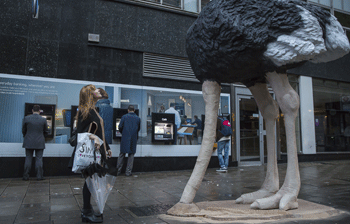Britain's psychological inertia contributes to 'financial hardship'

Psychologists from the University of Sheffield will explore the truth behind behaviour costing the UK £7.6 billion, at the new Institute of Inertia launched today (Wednesday 23 September 2015).
The institute, commissioned by comparethemarket.com, was established in the wake of alarming findings which reveal the extent to which inaction makes people time, health and economically poor.
A group of experts will join the Institute and meet periodically to discuss the latest research findings with the intention of proposing real-life solutions relevant to the wider public audience.
Dr Thomas Webb, a social psychologist at the University of Sheffield who specialises in understanding how people achieve their goals and make changes to their behavior, will lead the Institute of Inertia's research.
"The fact that people could save money is widely documented, but we know less about what causes people to spend more than they need to," said Dr Webb.
"We suspect that one reason could be 'psychological inertia' – this is the idea that people can be resistant to change and so keep doing things (or not doing things) even if they are not in their best interests. There is the potential for this to contribute to the UK's financial hardship."
A new report on the issue of inertia, commissioned by comparethemarket.com, questioned 2,052 people to understand their attitudes towards household bills. Almost a quarter (24 per cent) of respondents reported that they 'worry' about their household finances at least once a week, rising to more than a third (40 per cent) on a monthly basis.
The issue of inertia was laid bare with findings that highlighted the lack of action when it comes to tackling the issue. Just 30 per cent said they had a budget which they were 'good at sticking to' while the same number (30 per cent) were the minority in saying that they 'shop around for the best deals'. More than one in five (22 per cent) said that they had 'never, or couldn't remember ever, researching whether they could make savings on their household bills.'
When it came to direct action, 53 per cent of respondents admitted that they've never switched a household utility bill (excluding moving into a new property).
In the last five years, people reported being more likely to have changed their hair style (52 per cent), favourite supermarket (50 per cent) or even favourite tipple (66 per cent) than their current account (just 26 per cent). A realisation of 'overspending' was singled out as the biggest factor in prompting switching of a household utility.
Dr Webb added: "One of the most significant challenges facing science and society is how to promote lasting changes in people's behaviour. What kinds of interventions influence the behaviours that lead to obesity or persuade people to use less energy in their homes?
"One reason that people might struggle to change is that they prefer not to think about their current behaviour – a phenomena referred to as the ostrich problem. The Institute will investigate this idea – and other possible reasons for inertia - across a number of areas affecting people's finances."
However, the research also found that people's desire to save on household bills is still strong. When asked about how much would need to be saved over a year to warrant a review of household bills, well over a third (44 per cent) said £100 would be the trigger point. This rose to 74 per cent at £1,000 despite new figures from comparethemarket.com revealing that up to £1,523.15 could actually be saved if people spent just one hour reviewing their household utilities.
Paul Galligan, Managing Director at comparethemarket.com said: "We have identified that consumers face real issues when it comes to managing their finances and there is a need to give consumers the help and tools that they need to be able to have better control over their money.
"Our ambition is for the Institute to develop real, achievable and simple ways to tackle behavioral barriers and inspire people into action. This is a long-term commitment, bringing a range of experts together to see how we can best help consumers to make better financial gains over time."
In time for the political party conference season in early October, Dr Webb will be working with think tank Social Market Foundation to compile a report on how the Government can help households overcome inertia.
More information: To mark today's launch of the institute, an online quiz has been developed to help people to understand the reasons for their financial inertia and how they could tackle this issue. Whether a person has their 'Head in the Clouds', 'Head in the Sand', or lets their 'Heart rule their Head' the quiz provides tips based on an individual's results. The quiz can be found at www.comparethemarket.com/inertia/quiz/
For more information on 'inertia' and the Institute of Inertia, including updates on its progress and regular commentary from the institution's expert panel please visit: www.comparethemarket.com/inertia/
Provided by University of Sheffield




















